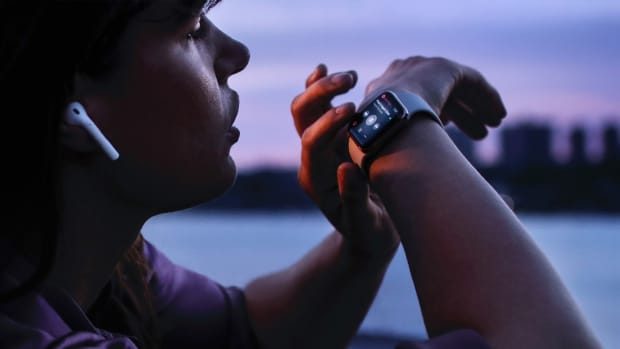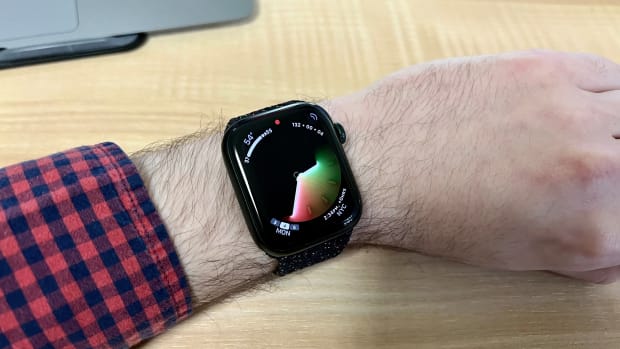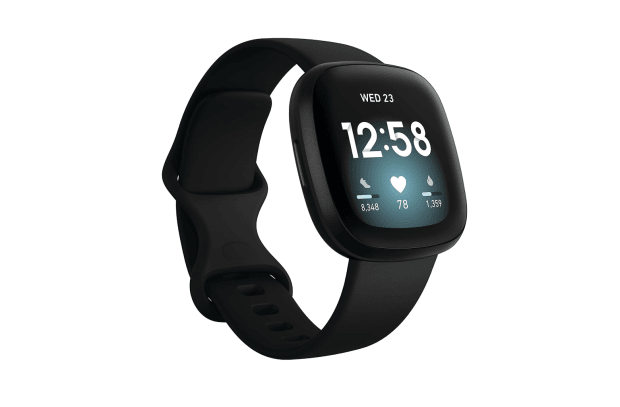
Justin Sullivan/Getty
The Arena Media Brands, LLC and respective content providers to this website may receive compensation for some links to products and services on this website.
With the summer travel season approaching, a smartwatch offers a handy way to check the time, read messages, track activity, and access your favorite apps when it’s not always convenient to reach for your phone.
Two of the most popular options are the Apple Watch Series 7 and Fitbit's Versa 3 -- both are fully functional smartwatches that can extend functions from your phone and perform the duties of a fitness tracker. So how do they stack up, head-to-head?
Apple Watch Series 7 (starting at $329.99, originally $399.99; amazon.com)

Jacob Krol/TheStreet
The Apple Watch Series 7 might retain a similar form-factor to the original, but Apple's smartwatch has come long way. The Series 7 starts at $399 for a 41mm and $429 for a 45mm GPS version, while the cellular-enabled models start at $499. Regardless, they'll wirelessly connect to your iPhone and act as a companion on steroids. You can send message, open apps, pay with Apple Pay and make calls from your wrist among other things.
New for the Series 7 is an always-on Retina display that is 20% larger than its predecessor. It lets you do more on the smartwatch's screen without needing to pull out your iPhone.
So, how well does the Apple Watch perform as a fitness tracker? Out of the box it can handle core activity tracking as well as various workouts with a high level of accuracy. Additionally, GPS will track workouts like runs or hikes. You can track your heart rate and even perform an electrocardiogram if you feel your heart may be performing differently from your norm. (Of course, you always want to consult a doctor if you think you may have a problem and act quickly if you suspect a heart attack or other cardiovascular problems.) ECG capabilities are a growing trend in smartwatches but are not a diagnostic tool. Additionally, Series 7 can tackle Blood Oxygen readings as well.
One big appeal of the Apple Watch are the Activity Rings, which are a daily metric for how active the wearer is. You can almost gamify the experience to close your rings and share them with your friends.
Related: Score an Apple Watch Series 7 for $70 Off
The Apple Watch battery lasts all day and takes roughly 45 minutes to charge up to 80% using the included fast-charging USB-C cable. Other charging methods will not charge it as quickly, though. The fast-charging capabilities make the new Series 7 more relevant as a sleep tracker since you can charge it up to 80% before bed and then boost it in the morning before you begin your activities for the day.
Any Apple Watch is also a solid solution for children or older adults who don’t want to carry a phone. The Family Setup feature, introduced in 2020, allows you to set up an Apple Watch independent of an iPhone. This enables you to attach a phone number to the watch as a separate device through your cellular phone carrier. You’ll be able to call, text, and use GPS location. However, you do need an iPhone for the initial setup.
Fitbit Versa 3 ($171.49, originally $229.95; amazon.com)

Amazon
The Fitbit Versa 3 boasts many improvements over its predecessor, and it’s well-poised to compete in a crowded market of wearables (like the Apple Watch) that do much more than track your activity, sleep, and heart rate. It's also a bit cheaper with an MSRP of $229.95 -- though, it's discounted to $171 on Amazon.
One big difference is that the Versa 3 does not have ECG capabilities. Instead, it features an updated heart rate algorithm and multi-path HR sensor for more accurate tracking. It also includes a built-in GPS with real-time pace and distance regardless of how close your phone is to your watch.
Another key advantage is the Versa 3’s ability to answer phone calls and activate the voice-to-text feature through the onboard mic and speaker as long as your Android phone is within Bluetooth range. This capability puts the Versa 3 firmly in the camp of other smartwatches and their abilities. Coupled with new connectivity to both Google Assistant and Amazon Alexa, where the Versa 2 worked only with Alexa, the Fitbit smartwatch offers a full suite of capabilities.
The Versa 3 also stands out for its long battery life and fast charging. The battery lasts 6+ days, making it the perfect option if you want to track your sleep consistently. And since the device charges in just 12 minutes, your tracker rarely has to leave your wrist.
Easily choose from 20 exercises to track, or let Smart Track record your activities without missing a beat. The Fitbit Versa 3 includes six months of Fitbit Premium. This gives you access to advanced analytics, fitness programs, and enhanced sleep and stress insights.
Bottom Line
At a lower cost than the Apple Watch, the Fitbit Versa 3 delivers nearly everything the best-in-class Series 7 does. iPhone users won’t enjoy the voice-to-text feature on the Versa 3, and there is no cellular connectivity.
Ultimately, it comes down to your needs and budget – and what smartphone you’re using right now. You’ll get the most out of your Fitbit with an Android smartphone, and you’ll maximize the functionality and connectivity of your Apple Watch Series 7 if you have an iPhone.
However, I’ve been test-driving the Versa 3 for a few weeks now with Fitbit Premium loaded onto my iPhone 12 and haven’t felt the Versa 3 lacking. I also tested the Apple Watch Series 7, which my daughter has been using since late December 2021. The Apple Watch can do a little more than the Versa 3. The key draw to this wearable is the convenience of using it as a stand-alone communication device even if the iPhone is not in proximity if you add it to your cell phone plan.
Both devices have their following and communities where you can connect with users. That community can help keep you on track toward your fitness goals for many people. If feeling better, moving more, and being healthier is your main impetus behind investing in a smartwatch, either device can get you there.
A Brief History of Fitbit and the Apple Watch
While the first smartwatch dates back to 1927, you'd hardly recognize it as the sleek wearables we sport today. Fitbit released its first fitness tracker in 2009, and Apple's arrived in 2015. It quickly became the world's bestselling watch (smart or otherwise) by 2017. Between January and June 2020, Apple Watch sales accounted for more than half the global revenue of all smartwatches sold.
Today, Fitbit remains a leader in fitness wearables but has expanded the capabilities of many of its products to rival other smartwatches on the market. The latest incarnation, Fitbit Versa 3, allows you to make and answer calls and texts as long as your Android phone is within Bluetooth connectivity range. This tremendous advantage puts the Versa 3 in the same league as the Apple Watch, Samsung Galaxy Watch, and other options.
Sure, the Apple Watch can connect directly through your cellular network. But comparing the Versa 3 with the Series 7 isn't as much like comparing apples to oranges (so to speak) as you may think.
Both wearables are industry leaders in their field and have many similar capabilities. While Apple continues to expand its watch's wellness and fitness aspects, the Fitbit Versa 3 has communications capabilities previous versions did not.
Prices are accurate and items in stock at time of publishing.







